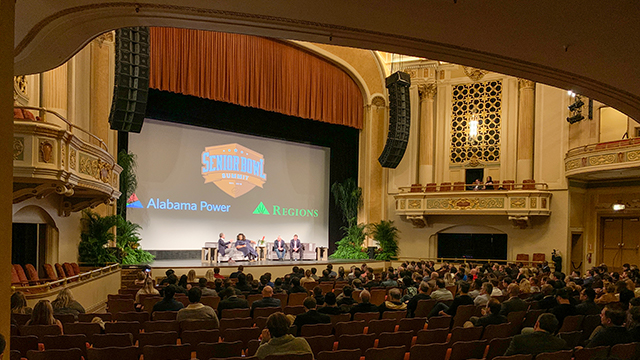The future is on its way to Alabama. That is inevitable.
What the future will bring is not.
But there is a potential future that many people want to bring to Alabama. Though it is sold as a future of freedom and equality, it is not a future in which people flourish.
Call it the Future of Conformity.
You have likely seen images of this future on television and the Internet. Perhaps you found those images baffling: Biological men demand to be referred to as women. Children are assigned birth certificates listing two mothers and no fathers, or two fathers and no mothers. Polyamorous throuples seek public approval of their relationships.
The Future of Conformity promises diversity, but it delivers uniformity and centralized control.
Everyone must approve of all lifestyle choices and family structures, by coercion if necessary. Central governments promise to solve problems that central governments helped to create, such as unresponsive and failing schools, transportation infrastructure that fails to meet local needs, housing shortages caused by land-use regulations and rising health care costs.
Worst of all, the Future of Conformity is ideological.
Students who are privileged enough to enroll in the most prestigious colleges and universities in the world object to hearing ideas that they find uncomfortable. Young people speak well of socialist ideals. Some even wear totalitarian symbols, such as images of Che Guevara (think of Berkeley) or variations on Nationalist Socialist symbols (think of Charlottesville).
We are told that the Future of Conformity is inevitable, and that those who resist it will end up on the wrong side of history.
And indeed, many of the cultural trends making their way toward Alabama are logically entailed in a certain conception of human freedom, a freedom to be affirmed in one’s identity and to satisfy one’s desires, whatever they happen to be. The Supreme Court of the United States expressed this concept of freedom in its 1992 decision in Planned Parenthood v. Casey, where the Court’s opinion asserted, “At the heart of liberty is the right to define one’s own concept of existence, of meaning, of the universe, and of the mystery of human life.”
Someone must pay the cost for such a radically unconstrained freedom.
Most often, the bill passes to children.
The cost is paid not only by the unborn, who exit abortion clinics by the back door in refuse containers, but also by children deprived of legal and personal connections to one natural parent (usually their father), and all those growing citizens who will someday inherit our debts and obligations.
People of faith and good conscience also pay a price.
The Future of Conformity has no tolerance for those who perceive the inherent value of natural marriage and the unique dignity of man and woman. It has little use for religious schools and tax-exempt religious assemblies. It demands freedom to expose young people to drugs and obscenity that corrupt.
Communities would also suffer.
All of the various and plural domains of civil society that have supplied the vitality of American exceptionalism from the beginning are likely to be supplanted by government in the Future of Conformity.
Alabamians and other Americans have always done their best work in small businesses and innovative startups, charities and aid groups and education societies, private and parochial schools, service clubs and volunteer organizations, and the other groups and associations that stand between the individual and the state, and which generate knowledge and new goods. The Future of Conformity has no place for them, except perhaps as useful vehicles for dispensing acceptable dogmas.
Anyone who has lived in the elite corridors of cultural power on America’s coasts has already experienced the Future of Conformity. If they are not indoctrinated in its ideologies, they will tell you that the Future of Conformity is stifling, not liberating.
It is a future in which people refrain from speaking obvious truths for fear of losing their jobs and reputations. It is a future without manners. It lacks understanding, yet, accuses the faithful and the knowledgeable of bigotry.
Here is the good news: The Future of Conformity is not inevitable.
We get to choose.
But we must choose something else. It is not enough to reject the Future of Conformity. We must offer our young people a different, brighter future.
A more attractive future would embrace the best aspects of our traditions while also advancing the genuine improvements we have made in achieving knowledge and justice. It starts with the primacy of religious faith, human reason, and natural rights. It would affirm our founding principles and celebrate those moments when we vindicated them, yet it would also candidly acknowledge that we have not always lived up to them and call us to do better.
Call it the Future of Ordered Liberty.
In the Future of Ordered Liberty, knowledge is passed on to the next generation; ignorance is vanquished. Schools and universities resist ideologies and reject calls for censorship even as they teach time-tested ideas and human achievements. Not all opinions are equally valid. The objective is knowledge of truth. Educators should pursue truth and should recognize the difference between truth and their own dogmas.
The Future of Ordered Liberty is a future in which genuine and justified civil liberties are secured and celebrated.
Intentional racial and ethnic discrimination is remedied and sanctioned, and people have freedom to speak important truths and to obey their conscience. The government secures property rights instead of threatening them and allows the plural groups and associations of civil society to flourish and to do their good work. Religious groups enjoy liberty as a matter of right, not as a concession of privilege from government.
The future is coming to Alabama. That much is certain.
What will the future look like?
That is up to us.
Adam J. MacLeod is Professorial Fellow of the Alabama Policy Institute and Professor of Law at Faulkner University, Jones School of Law. He is a prolific writer and his latest book, The Age of Selfies: Reasoning About Rights When the Stakes Are Personal, is available on Amazon.













